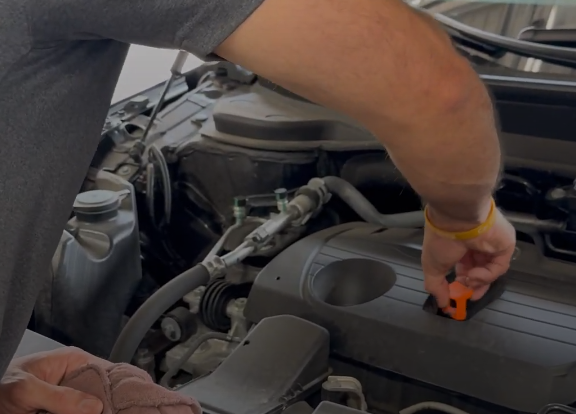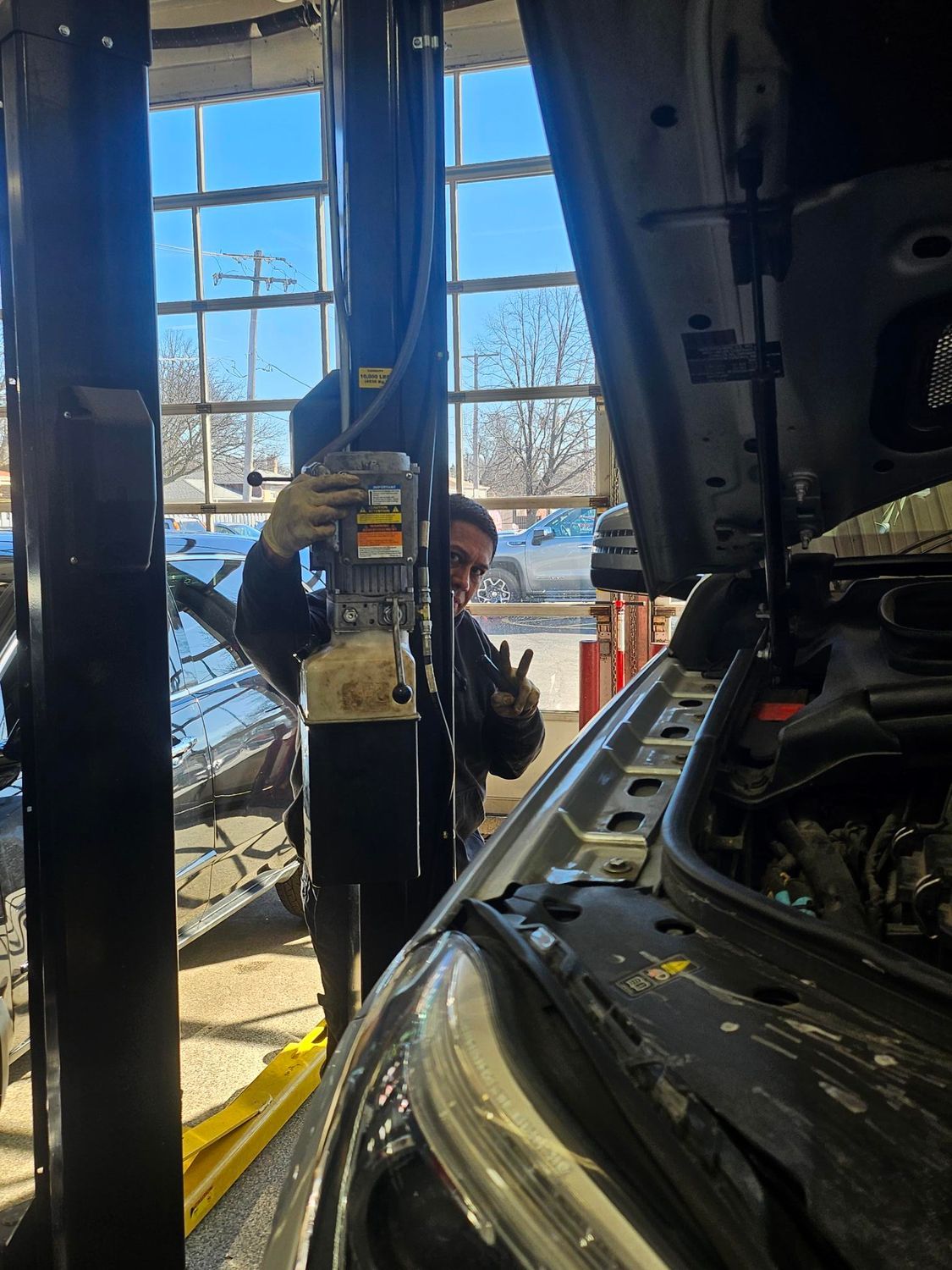Optimal Vehicle Performance: Importance of Regular Oil Level Checks
Regular oil level checks are a crucial part of maintaining your vehicle's performance. By understanding the importance of checking your car's oil, you can prevent potential engine damage and ensure that your vehicle runs smoothly. Neglecting oil level checks can have a significant impact on your vehicle's overall performance, leading to costly repairs and decreased fuel efficiency.
Checking your oil level is a simple yet essential task that should be included in your regular maintenance routine. By lifting the hood and performing this quick job, you can ensure that your engine has enough lubrication to withstand the heat and friction it encounters during operation. This small step can go a long way in prolonging the life of your engine and improving its efficiency.
So let's dive in and explore some helpful tips provided by manufacturers to help you keep this important aspect of car maintenance top of mind.
Importance of Regular Oil Level Checks for Optimal Vehicle Performance
Regular oil level checks are crucial for maintaining optimal performance in your vehicle's engine. By ensuring proper lubrication for all moving parts, these checks help prevent overheating and reduce friction within the engine. Regularly checking your car's oil can help identify any leaks or issues that may affect its overall performance.
Proper Lubrication for All Moving Parts
One of the primary reasons why regular oil level checks are important is to ensure proper lubrication for all the moving parts within the engine. Engine components such as pistons, crankshafts, and camshafts rely on a thin film of oil to reduce friction and heat. Without adequate lubrication, these parts can wear out quickly and cause damage to the engine. By checking the oil levels regularly, you can ensure that there is enough oil present to provide effective lubrication.
Prevention of Overheating and Reduced Friction
Maintaining optimal oil levels is essential for preventing overheating in your vehicle's engine. Oil acts as a coolant by absorbing heat generated during combustion. If there is insufficient oil in the engine, it cannot effectively dissipate this heat, leading to increased temperatures that can result in severe damage. Regularly checking the oil levels allows you to add more if needed, ensuring that your engine remains cool and operates efficiently.
In addition to preventing overheating, regular oil level checks also help reduce friction within the engine. Friction occurs when two metal surfaces rub against each other without sufficient lubrication. This friction not only causes wear and tear but also reduces fuel efficiency over time. By maintaining optimal oil levels through regular checks, you minimize friction between moving parts and promote smoother operation.
Identification of Leaks or Issues
Another significant benefit of checking your car's oil regularly is the ability to identify any leaks or issues that may impact its performance. Low or decreasing oil levels could indicate a leak in the engine or other parts of the vehicle. By catching these issues early on, you can prevent further damage and costly repairs. Regular oil level checks allow you to monitor the condition of the oil itself. If you notice any unusual coloration or debris in the oil, it could indicate a problem that needs attention.
Key Benefits of Regular Oil Changes for Engine Longevity
Regularly changing your car's oil is crucial for maintaining optimal vehicle performance and extending the lifespan of your engine. By adhering to a consistent oil change schedule, you can reap numerous benefits that contribute to the long-term health and efficiency of your engine.
Removes Dirt, Debris, and Contaminants
Fresh oil plays a vital role in keeping your engine clean and free from harmful substances. Over time, dirt, debris, and contaminants can accumulate in the oil, leading to increased friction and wear on engine components. Regular oil changes ensure that these impurities are effectively removed from the system. This helps prevent damage to critical engine parts such as pistons, cylinders, and valves.
Enhances Lubrication
Proper lubrication is essential for reducing friction between moving parts within the engine. When you have new oil in your car, it provides optimum lubrication to all the necessary components. This reduces strain on the engine and allows it to operate more efficiently. With improved lubrication, you'll experience smoother performance and reduced wear on vital engine parts.
Reduces Engine Strain
As engines age or when using conventional oil types that break down over time, their viscosity decreases. This means that they become less effective at providing proper lubrication and protection to internal components. Without regular oil changes, your engine may experience increased strain due to inadequate lubrication. This strain can lead to overheating issues, decreased fuel efficiency, and even potential breakdowns.
Improves Fuel Efficiency
Engines that are properly maintained with regular oil changes tend to be more fuel-efficient. Fresh oil helps reduce friction between moving parts in the engine, which results in smoother operation and less energy wasted due to heat generation caused by excessive friction. As a result, you'll notice better gas mileage over time.
Prolongs Engine Life
By following a routine maintenance schedule that includes regular oil changes, you significantly increase the lifespan of your engine. The removal of impurities, improved lubrication, reduced strain, and enhanced fuel efficiency all contribute to a healthier and longer-lasting engine. With proper care and maintenance, you can avoid costly repairs or premature engine failure.
Regular oil changes are an essential part of vehicle ownership that should not be overlooked. By taking the time to change your oil at recommended intervals and using high-quality oil filters along with new oil, you can ensure optimal engine performance and longevity. Don't underestimate the power of this simple maintenance task – it can save you money in the long run by preventing major engine issues.
Steps to Check Your Car's Engine Oil
To ensure optimal vehicle performance, it is crucial to regularly check the oil level in your car. This simple maintenance task can help prevent engine damage and extend the lifespan of your vehicle. Here are the steps to follow when checking your car's engine oil:
Park your vehicle on a flat surface
Before you begin checking the oil level, make sure to park your car on a flat surface. This will ensure that the readings you obtain are accurate. Allow your vehicle to cool down for a few minutes before proceeding with the oil check.
Locate the dipstick under the hood
The dipstick is a long, thin metal rod usually labeled with a bright-colored handle. You can find it under the hood of your car, typically near the engine block. Look for any markings or labels indicating its location.
Pull out and wipe clean
Once you have located the dipstick, pull it out from its housing carefully. Take note of how far it extends so that you can reinsert it fully later on. Before checking the oil level, use a clean cloth or paper towel to wipe off any existing oil residue from the dipstick.
Reinsert and remove again
After wiping off the dipstick, reinsert it fully back into its housing until it is seated securely. Then, take it out once more to check the oil level against the markings on the stick. The markings may indicate minimum and maximum levels or simply "low" and "full."
By following these steps, you can quickly assess whether your car needs an oil top-up or if an oil change is necessary.
Regularly monitoring your car's engine oil level has several benefits. Firstly, maintaining an adequate amount of clean oil ensures that all moving parts within your engine are properly lubricated, reducing friction and wear. Secondly, having sufficient oil helps regulate engine temperature by dissipating heat generated during operation.
Neglecting to check your car's oil level regularly can lead to various issues. Insufficient oil levels can cause excessive friction, leading to premature engine wear and potential damage. On the other hand, overfilling the oil can result in foaming and reduced lubrication efficiency.
By taking a few minutes to check your car's engine oil regularly, you can ensure that your vehicle operates smoothly and efficiently. It is a simple yet effective way to maintain optimal performance and extend the life of your car's engine.
Frequency of Oil Changes
Regular oil changes are crucial for maintaining the performance and longevity of your vehicle. But how often should you change the oil? Well, that depends on various factors such as driving conditions and manufacturer recommendations. Let's delve into the frequency of oil changes and why they matter.
Frequency of Oil Changes
Most vehicles require an oil change every 3,000 to 5,000 miles or every three to six months. However, it's important to note that this can vary depending on your specific vehicle and driving habits. Consulting your owner's manual or a trusted mechanic is key in determining the ideal interval for your car.
Keeping up with regular oil changes ensures that your engine runs smoothly and efficiently. Over time, engine oil breaks down due to exposure to heat and contaminants. As a result, it becomes less effective at lubricating the engine components and removing dirt particles. By changing the oil at recommended intervals, you prevent excessive wear and tear on vital engine parts.
Neglecting regular oil changes can lead to several issues that can affect your vehicle's performance. As old oil accumulates debris and sludge, it becomes thicker and less able to flow freely through the engine. This can result in reduced fuel efficiency, decreased power output, and potential damage to critical engine components.
Furthermore, dirty or low-quality oil can cause increased friction between moving parts within the engine. This friction generates excess heat, which can lead to overheating issues if not addressed promptly. Excessive heat can also cause seals to deteriorate faster, leading to leaks or other costly repairs.
Regularly checking your vehicle's oil level is just as important as changing it regularly. Low oil levels can be indicative of leaks or burning excessive amounts of oil – both of which require attention from a professional mechanic.
In addition to checking the quantity of oil in your vehicle's engine, pay attention to its quality. Oil that appears dark and dirty may indicate the need for an oil change, even if it hasn't reached the recommended mileage interval. Conversely, if the oil appears milky or foamy, it could be a sign of coolant leakage into the engine – a potentially serious issue that warrants immediate attention.
Consequences of Neglecting Oil Changes
Increased Engine Wear and Reduced Performance
Neglecting to change your car's oil regularly can have serious consequences on the performance and longevity of your vehicle. Over time, the oil in your engine becomes dirty and breaks down, losing its ability to effectively lubricate the moving parts. This can lead to increased friction and wear on vital components, such as the pistons, cylinders, and bearings.
As a result, the engine may not operate as smoothly as it should, leading to reduced performance. You may notice a decrease in acceleration or power when you press down on the gas pedal. Ignoring regular oil changes can also cause excessive heat buildup within the engine, further contributing to decreased performance.
Sludge Buildup and Clogged Filters
Dirty or old oil can accumulate impurities over time, forming sludge that can clog up various parts of your engine. This sludge buildup restricts proper oil flow and can lead to serious damage if left unchecked. The oil filter is designed to catch these impurities; however, if it becomes overwhelmed with contaminants due to infrequent oil changes, it may become clogged or bypassed altogether.
When filters are clogged or bypassed, harmful particles circulate freely throughout the engine. This compromises its efficiency and increases the risk of abrasive materials causing damage to sensitive components. The presence of sludge can also hinder the cooling properties of fresh oil by reducing its ability to dissipate heat effectively.
Decreased Fuel Efficiency
One often overlooked consequence of neglecting regular oil changes is decreased fuel efficiency. As mentioned earlier, dirty or old oil loses its effectiveness in lubricating moving parts properly. When this occurs, more energy is required for these parts to function correctly.
The increased friction caused by insufficient lubrication leads to greater resistance within the engine system. Consequently, your vehicle needs more fuel to compensate for this added strain on the engine. This results in reduced mileage per gallon and ultimately costs you more money at the pump.
Warranty Coverage and Costly Repairs
Failing to adhere to regular oil change intervals can have financial implications as well. Many vehicle warranties explicitly state that proper maintenance, including regular oil changes, is required to keep the warranty coverage valid. Neglecting this essential aspect of car care may result in voided warranty coverage, leaving you responsible for any repairs or replacements that may arise.
The consequences of neglecting oil changes can lead to costly repairs down the line. Engine damage caused by dirty oil or sludge buildup can be extensive and require expensive parts and labor to rectify. By simply maintaining a regular oil change schedule, you can help prevent these costly issues from arising in the first place.
Regularly checking your vehicle's oil level is crucial for optimal performance and longevity.
Benefits of Professional Oil Changes vs DIY Options
Correct Type and Amount of Oil
Professional oil changes ensure that the correct type and amount of oil are used for your vehicle. Certified technicians have the knowledge and expertise to determine the specific oil requirements for different makes and models. They consider factors such as viscosity, additives, and manufacturer recommendations to select the most suitable oil for optimal performance.
Potential Issue Identification
During an oil change performed by a professional, certified technicians can identify potential issues that may go unnoticed during a DIY oil change. They have the necessary training and experience to inspect various components of your vehicle while changing the oil. By detecting any signs of wear or damage early on, they can prevent future problems from arising and save you from costly repairs down the line.
Expertise and Equipment
While DIY oil changes may seem like a cost-saving option upfront, they often lack the expertise and equipment available at professional service centers. Certified technicians undergo rigorous training to stay up-to-date with industry advancements and best practices. They have access to specialized tools that enable them to perform thorough inspections, efficiently drain old oil, replace filters, and properly dispose of used fluids.
Long-Term Cost Savings
Although DIY oil changes may save you money in the short term, opting for professional service can actually lead to long-term cost savings. Certified technicians use high-quality oils that provide better protection against engine wear and improve fuel efficiency. This helps extend the lifespan of your engine, reducing the likelihood of major breakdowns or premature engine failure.
Warranty Considerations
If your vehicle is still under warranty, it's important to note that some manufacturers require regular maintenance at authorized service centers in order to keep your warranty valid. By choosing professional oil changes over DIY options, you ensure that all maintenance records are properly documented by certified technicians who follow manufacturer guidelines. This can be beneficial if you ever need warranty-related repairs or claims in the future.
Frequently Asked Questions about Engine Oils and Maintenance
What type of oil should I use for my car?
Choosing the right oil for your car is crucial for optimal vehicle performance. The type of oil you should use depends on several factors, including the make and model of your vehicle, as well as the recommendations provided by the manufacturer. It's essential to consult your vehicle's owner manual or reach out to a trusted mechanic to determine the specific oil type that suits your car.
Can I mix different brands or weights of engine oils?
Mixing different brands or weights of engine oils is generally not recommended. Each brand and weight of oil has its own unique formulation and additives that work together to provide proper lubrication and protection to your engine components. Mixing oils can disrupt this delicate balance, potentially leading to inadequate lubrication, increased wear and tear on engine parts, and even potential engine failure. To ensure optimal performance and longevity of your engine, it is best to stick with one brand and weight recommended by the vehicle manufacturer.
How often should I check my car's oil level?
Regularly checking your car's oil level is an important part of routine maintenance. It allows you to monitor the health of your engine and catch any potential issues before they escalate into costly repairs. As a general rule of thumb, it is recommended to check your car's oil level at least once a month or before embarking on long trips.
Checking the oil level is a simple process that involves locating the dipstick under the hood, pulling it out, wiping it clean with a cloth or paper towel, reinserting it fully, then pulling it out again to read the current oil level. If the level falls below the minimum mark indicated on the dipstick, it's time for an oil top-up.
Keeping an eye on your car's oil level ensures proper lubrication for all moving parts within the engine. Insufficient levels can lead to increased friction, overheating, and potential engine damage. By regularly checking the oil level, you can prolong the life of your engine and ensure optimal performance.
Conclusion
In conclusion, regular oil level checks are crucial for maintaining optimal vehicle performance and engine longevity. By ensuring that your car has the correct amount of oil, you can prevent potential damage to the engine, improve fuel efficiency, and extend the lifespan of your vehicle. Neglecting oil changes can lead to various consequences such as increased friction, overheating, and even engine failure. Therefore, it is essential to prioritize regular oil level checks and timely oil changes to keep your car running smoothly.
To ensure the best results, it is recommended to consult your vehicle's manual for specific guidelines on oil change intervals and procedures. Seeking professional assistance for oil changes can provide added expertise and peace of mind. By following these practices and staying proactive in maintaining your car's oil levels, you can enjoy a reliable and efficient vehicle for years to come.
FAQs
What is the importance of regular oil level checks for optimal vehicle performance?
Regular oil level checks are crucial for maintaining optimal vehicle performance. Adequate oil levels ensure proper lubrication of engine components, reducing friction and preventing excessive wear and tear. This helps to extend the lifespan of the engine, enhance fuel efficiency, and promote smooth operation.
How often should I check my vehicle's oil level?
It is recommended to check your vehicle's oil level at least once a month or as advised in the owner's manual. However, if you frequently drive long distances or under severe conditions, such as extreme temperatures or towing heavy loads, more frequent checks may be necessary.
What happens if my vehicle has low oil levels?
Insufficient oil levels can lead to various issues that negatively impact vehicle performance. It can result in increased friction between moving parts, leading to overheating and potential engine damage. Low oil levels reduce lubrication effectiveness, which may cause poor fuel economy and decreased power output.
How do I check my vehicle's oil level?
To check your vehicle's oil level:
- Park on a flat surface and turn off the engine.
- Locate the dipstick (usually yellow or orange) under the hood.
- Pull out the dipstick, wipe it clean with a cloth or paper towel.
- Reinsert the dipstick fully into its tube.
- Remove it again and observe where the oil level reaches on the dipstick.
- Ensure that it falls within the recommended range indicated by "full" and "add" marks on the dipstick.
Can I add any type of motor oil if my car needs topping up?
It is important to use the correct type of motor oil recommended by your vehicle manufacturer when topping up your car's engine oil. Refer to your owner's manual or consult with a professional mechanic to determine which specific motor oil grade and viscosity are suitable for your vehicle. Using the wrong oil can potentially harm your engine.













